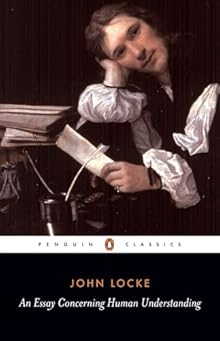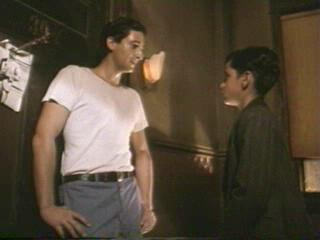Movies 1981-2002 (Common Theme: Great Depression)The Road to Perdition (2002)
My main impressions while watching this movie:
What is the point of this story?
I'm not buying Paul Newman and Tom Hanks as ruthless gangsters, especially to the extreme they are supposed to be in this movie.
I can more easily buy Daniel Craig and Jude Law as sociopaths, I guess, though I don't get the point of their characters either.
Despite a lengthy trail of corpses and bank robberies, no police ever appear. They do not exist in this movie. The characters only have to worry about other gangsters.
It might be worth seeing just for the sets and clothes and heavily artsified 30s ambiance. If they hadn't actually gunned down a child and his mother in their own bathroom I would probably say it was definitely worth seeing.
Jennifer Jason Leigh, in the period (1931) dress and hair, looks quite a bit like my wife in this, which probably caused the scene where she is murdered with the child in cold blood to upset me more than it ordinarily would have. I know this is at least the 3rd time I have said a movie actress resembles my wife (Shirley Maclaine circa
The Apartment and Sybil Seeley from the Buster Keaton movies are the other 2 I can think of off hand), but in each instance something in the resemblance was striking enough to make an impression that I thought it worthwhile to take note of.
I wondered how differently the history of cinema might have developed if the United States had not been the dominant filmmaking country during the formative years of this art. Specifically I was assuming that the genre of the super-violent gangster film would not have attained quite the place of esteem in the cinematic repertoire that it has attained, to the point that nations as disparate as Britain and Korea, who do not have much of a history of their citizens engaging in machine gun massacres and shootouts in their streets and places of public business, feel impelled to regularly make movies in which as many people are blown away by advanced weaponry in a single scene as normally die in such manner in a couple of decades in those countries.
It may be argued that my quibbles about the lack of realism in certain instances in this movie are prosaic and beside the point, that the narrative does away with these restrictions because it is really about other things. In the present case however this is where the movie, which is otherwise almost impeccably made, most falters. The departure from probability and consistency within the parameters it sets out, especially given the excessive brutality of its violence, I found to be too great. Most stories that attain a degree of cultural importance require some suspension of literal disbelief, to be sure, but the psychology of the characters has to be believable and consistent within the parameters of whatever imagined or idealized world they are inhabiting, which also necessitates the mental and emotional universe of that world being comprehensible to the audience. That did not occur to my satisfaction here.
Tarzan (1999)In addition to the undiscriminating reviewer who overly loves TV movies, my system suffers from another critic who has caused me to suspect him or her to be in the employ of the Walt Disney Corporation, so uniformly and emphatically partial to the works of this studio he be. There are a few Disney movies that I will admit to liking, though they were all made before 1960; the artistic sensibility of the pre-1945 productions especially, middlebrow though it was, is of an entirely different order from what they seem to be able to muster lately.
This late model Tarzan, following in the train of the big 90s hits like The Lion King and Beauty and the Beast, wholly escaped my notice on its initial appearance. I was willing enough to like it if it had moved me to do so, but I did not see anything the least noteworthy or at all different from any other 90s Disney movie.
King of the Hill (1993)
Another movie set in the Great Depression ('33 I believe was the year in this case) which seems to have been a recurring theme with me lately, or perhaps the time is such a good one to set movies in that more of them turn up on my list than they do from other periods. While Road to Perdition was based on a comic book/graphic novel and had a more mythical atmosphere about it, this was based on a memoir by a more conventional earnest writer type (A. E. Hotchner, of whom I had not previously heard). Despite being directed by Steven Soderbergh, whom I thought was considered an A or near A-list director, having a largely recognizable if not star-studded cast, and receiving almost uniformly positive reviews, the film is still not available on DVD. (I still have a VCR, so I bought an old videotape and watched that).
The sets and props and costumes lack the calculated grandeur and overall sense of Sturm und Drang, so in keeping with the post-millenial spirit, that we got in Road to Perdition, and are more in what I would consider the 'traditional' Depression period-piece style, iron bedsteads, print dresses in muted colors, peeling wallpaper and flaking plaster, scratchy radios, dusty streets, all of which motifs I am much more comfortable with. They boil some hot dogs--never destined to be eaten, as it happens--in water in a big heavy pot at one point which for some reason I found extremely pleasing, as if the image summed up all of my most superficial feelings about the 1930s in a single blow. While there is a plot, and a not wholly insignificant one, the interest in the movie to me rests on the effectiveness of these images from the lives of our grandparents and great-grandparents and what relevance we can be persuaded to think they have for us now. It is about half-successful in this.
This movie has a couple of early 80s era actresses whose careers never really blew up big but whom I always liked a little, Lisa Eichhorn and Elizabeth McGovern. Lisa Eichhorn is 41 here, my age exactly now, and she still looks like her sweet senstive self. Now she is 59 and she looks old and not like her sweet sensitive self at all. This is nothing to the point except that I probably had not thought about her since around that time, so it came as rather a shock to realize that she was nearly 60 now. 1993 in certain things does not seem to me a long time ago. I was already with my wife in that year, for example, and she is still only in her 30s, and does not seem to me to have changed all that dramatically. Elizabeth McGovern probably is not much my type personality-wise. However she always reminds me of my main junior high love interest, who was also named Elizabeth, who also had an Irish surname beginning in McG--, who also had short cropped curly brown hair, and who due to the custom of forcing students to sit in rows in alphabetical order in class which was the rule in my middle school was seated about 2 feet in front of me around five hours a day for two years. Though she engaged in some mild teasing, on the whole she was cordial to me, and even danced with me twice at the Christmas dance in 1983, which was practically the highlight of the entire decade of the 80s as far as I was concerned; nonetheless she expertly managed me so that my passion remained always at a fairly low boil and never threatened to burst out in an unseemly spectacle, which looking back I think is quite admirable. She was flirty and playful without being conniving or narcissistic, and at least in junior high and early high school she always maintained a genuine respectability without being a killjoy, all of which are qualities I like in females. But all of this has very little to do with Elizabeth McGovern outside of my own head...
On Golden Pond (1981)

Just a few postings ago I mentioned that I had never seen this New Hampshire-set movie, a few days after which my system predictably turned it up to go on my list. This summer happens to be the film's 30th anniversary, so there are a number of events in New Hampshire commemorating the occasion as well, such as local theatrical productions of the original play and so on. I am not planning on attending any of them, but I think it is of interest to note that these goings-on are in the atmosphere as I try to make some sense of this old--in many ways really prematurely old--movie for myself.
In the first place I suspect that the most noteworthy aspect of the picture is the performances of Katherine Hepburn and Henry Fonda, which appear to be so strikingly good that one almost wonders if it is not somehow an illusion, and that either the rest of the cast, or the writing of their characters, are abnormally terrible, or that there is something in the old legends' superior, almost effortlessly self-assured bearings that hoodwink the viewer into thinking their acting work grander than it really was, because we have become unaccustomed to seeing these particular qualities in our contemporaries. The dominance of the aged stars also contributes to the film's seeming to belong to a more remote past than it really does, Hepburn and Fonda's careers of course dating back to the earliest days of talking pictures, nearly half the entire history of which is (remarkably) contained within my own lifetime, but which are such a ubiquitous part of our cultural lives that its early era psychologically feels nearly as distant to us as artistic movements hundreds of years old.
The story is also dated in other of its concerns. Its primary theme is the generational conflict between the hard core of the Depression/WWII generation (Hepburn and Fonda) and their children, the Silent Generation that came of age in the 50s and early 60s. Unlike the baby boomers, who though usually obnoxious even they aren't being dangerously wrong-headed are at least adversarially strong, the Silents were never much of a match for their elders, and even in this movie which was clearly written by one of their number (it has been noted that the cohort of Americans born in the 1930s has been highly prolific and accomplished in most of the arts comparative to most of those which followed it), which I gather was intended to present their situation in a sympathetic light and try to reconcile especially the Henry Fonda character's overbearing and stifling qualities with his strong ones, they come across as almost hopelessly weak and stunted in their development when juxtaposed against their parents. One of the major plot threads is that Henry Fonda and his daughter (played by his actual famous daughter Jane, whose limited acting ability contrasted against her father's brilliance while essentially on his deathbed only further emphasizes the previous point) are estranged because he was hard and emotionally distant. In 2011, with middle class society on the brink of collapse and when our concerns are almost exclusively socio-economic, these 1970s era complaints about domineering and emotionally unavailable fathers strike one as almost quaint. From our vantage point, Henry Fonda hardly seems like such a terrible father. Besides being married and having a better relationship with his children's mother than most contemporary men are able to manage, he not only had a career, but quite a prestigious one (professor at an Ivy League university! think of the advantages! the connections!). The children doubtless were all sent to private schools. He was a competent outdoorsman and was a good role model as far as not being a total pussy or woman-dominated man goes. No evidence is offered that he beat his children unduly. Who cares that he was not the most cuddly guy in the world? Where is all this sensitive new age fathering getting us anyway?
This was filmed at Squam Lake in New Hampshire, about a 45 minute drive from my house. While I have driven past it numerous times, I have never actually gone in or on it, though I believe there are points that are publicly accessible. There are a multitude of other lakes around that I have been to, so it is more a matter of chance that I have not been there rather than socioeconomic deprivation, though I am under the impression that it is one of the more expensive lakes in the area as far as property values. Although I don't think of myself as having any friends, I have still managed over the years to get myself invited to a few private cabins on other lakes, several of which were older and a lot like the one in the movie, though the ones I visited were probably a little smaller. It has been a trend since affluent people began to really rake in the bucks in the mid-90s to knock down these older cabins and build something more in keeping with one's contemporary level of grandeur, but there are still a good number of old New Englanders of more modest means clinging to the old cabins their family bought in the 40s. These are the people I mainly know. Of course the temptation to sell out when mom finally passes on is increasingly great, and if Mitt Romney (to name one noted summerer on the New Hampshire lakes) or one of his buddies is the buyer, you can be sure they won't be keeping the old house standing, unless it is to store boats and take showers in.
 Book IV, Chap XVII ("Reason"): "Secondly, another way that men ordinarily use to drive others, and force them to submit their judgements, and receive the opinion in debate, is to require the adversary to admit what they allege as proof, or to assign a better. And this I call argumentum ad ignorantiam". This is an excellent point.
Book IV, Chap XVII ("Reason"): "Secondly, another way that men ordinarily use to drive others, and force them to submit their judgements, and receive the opinion in debate, is to require the adversary to admit what they allege as proof, or to assign a better. And this I call argumentum ad ignorantiam". This is an excellent point.
 "Tell a man passionately in love that he is jilted; bring a score of witnesses on the falsehood of his mistress, it is ten to one but three kind words of hers shall invalidate all their testimonies."
"Tell a man passionately in love that he is jilted; bring a score of witnesses on the falsehood of his mistress, it is ten to one but three kind words of hers shall invalidate all their testimonies."





